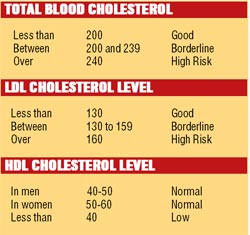
When GOOD Can turn EVILYou may be surprised to discover, that the old adage - 'you can have too much of a good thing' applies, among many other things, to cholesterol as well. "Cholesterol is actually an essential thing," reveals Prof. Shyam Fernando of the Faculty of Medicine, University of Colombo, discussing with MediScene, the Jekyll and Hyde nature of cholesterol and what it really means to your health.
Cholesterol is a vital component in the cell membranes of all animal cells and is also necessary to make certain hormones, vitamin D and bile. However, when the blood cholesterol level rises, it becomes a risk factor for one of the main killers in our country - coronary heart disease. The Good, the Bad, and the Ugly Like other lipids, cholesterol does not dissolve in water, and is in fact transported in the blood as lipoproteins. There are two main types of lipoproteins. The first type - High Density Lipoprotein or HDL is considered 'good cholesterol'. HDL protects against atherosclerosis (deposition of plaque like material on the inner lining of blood vessels, making them narrow) and heart attacks. It is thought that HDL removes cholesterol from atherosclerotic plaques and transports them away from the blood vessels to the liver where they are broken down (metabolized). A low level of HDL may even increase the risk of heart attacks.
High levels of 'bad' cholesterol on the other hand, are far from beneficial. High levels of low density lipo-proteins or LDL, often called 'bad cholesterol,' hasten atherosclerosis and increase the risk of heart attacks. Another 'ugly' aspect of the build-up of plaques inside the blood vessels is that they damage the smooth lining which is meant to ensure the even flow of blood. Over time, little bumpy plaques appear and eventually rupture, leaving the surface rough. This may then lead to a blood clot being deposited there. Vessels serving the heart, the brain and even those that go down into the legs are particularly vulnerable to blocks. But it is not only what we eat, but how our body handles cholesterol that is important, and in this sense, appearances can be deceptive. It is a common myth that only obese people have cholesterol. The truth is, the way your body handles cholesterol depends on your genetic makeup. That is why some people who are not obese and who eat low cholesterol, low fat food still have high levels of cholesterol in the blood.
They often have family members with high cholesterol. Such people inherit a condition called familial hypercholesterolemia, meaning, very high cholesterol levels run in the family. Others, especially those with a family history of diabetes, may have inherited high triglyceride levels (hypertriglyceridemia). (Triglycerides is another type of blood fat that when found in very high levels, poses a risk for ischaemic heart disease.) Know your cholesterol levels Everyone over 40 should test for cholesterol, but those who have other risk factors like diabetes, high blood pressure, a family history of heart attacks, or smoking should check more often - at least once a year, or more depending on the advice of your physician. A simple blood test can measure your cholesterol level in the blood. About 14 hours of fasting is generally recommended before doing a cholesterol test. When looking at your results, you will find that cholesterol is measured in mg/dl (read as milligrams per deci litre or in mmol per litre). Please see table below.
Managing your cholesterol intake It is well known that we get cholesterol from the food we eat. What is less well known is that our body makes its own cholesterol as well. Because of this, regulating one's diet is a crucial part of managing cholesterol levels. Foods rich in cholesterol include meat and fish (not only crabs and prawns), milk, cheese, butter and egg yolk. Plants on the other hand, have no cholesterol, so those wanting to avoid cholesterol can safely partake of vegetables, fruits, cereals and legumes. Also foods high in soluble fibre, such as oat bran, dried beans and peas, and some fruits are very helpful in lowering cholesterol levels, especially LDL. It is recommended that cholesterol in your diet should not exceed 300 milligrams a day. Staying healthy In the end, staying healthy is about more than just getting your cholesterol alone under control and the way to avoid heart attacks and strokes is to pay attention to all the risk factors, including your weight, blood pressure, and general lifestyle choices. Explaining that the incidence of strokes and heart disease seems to be on the rise, Prof. Fernando emphasises that now more than ever, care is needed. The fact is that several factors working together are responsible for coronary vascular disease - heart attacks - and cerebral vascular disease - strokes - and only if these are all addressed can anything be accomplished. When most patients focus only on the cholesterol, they fail to take into account the other risk factors.
Firstly, being practical about what you can and cannot change, and then setting out to change and control what you can, may be the best plan of action. For starters, accept that there are some factors that are non-modifiable, says Prof. Fernando, citing genetics and increasing age. "There is nothing we can do about them, instead we must focus on those we can change - the modifiable risk factors." These include cholesterol itself, controlling your sugar levels if you are diabetic, quitting smoking, lowering high blood pressure, dieting to maintain a healthy weight and nutrition, and altering sedentary lifestyle patterns. Getting exercise for at least 30 minutes, five days a week can also make a world of difference. "Keeping your cholesterol under control is a lifelong commitment," says Prof. Fernando, adding that even if medication has given you a reprieve, you must continue to watch your health. |
|| Front
Page | News | Editorial | Columns | Sports | Plus | Financial
Times | International | Mirror | TV
Times | Funday
Times | MediScene || |
| |
Copyright
2007 Wijeya
Newspapers Ltd.Colombo. Sri Lanka. |




